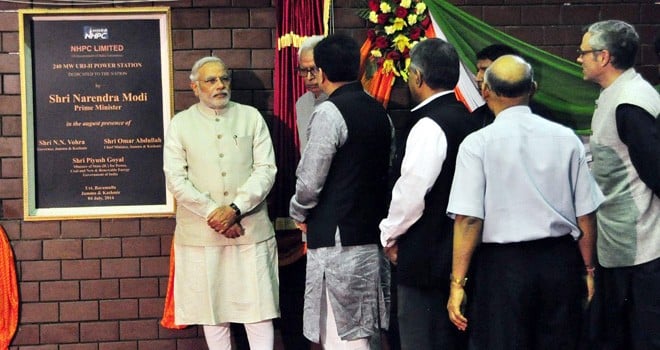
The leadership of India and Pakistan enjoy the required political mandate to take bold initiatives on Kashmir

Prime Minister Narendra Modi’s recent visit to the Indian held Jammu and Kashmir concluded amid near-to-complete strike in Srinagar called by All Parties Hurriyat Conference (APHC) and various other outfits. His first visit being the prime minister of India made no headway or major political breakthrough in the restive state of Jammu and Kashmir.
Modi chaired a high level meeting in the military headquarters, inaugurated a hydel power project and flagged off the Katra-Udhampur rail link. During the whole day, he never mentioned the long festering conflict and political turmoil in the state let alone promising any political or economic package for Kashmir. One wonders about Modi’s policy on Kashmir.
It seems that development of the state is on his agenda. The premier said, "Our priority is to win the hearts of every citizen of this state through development". In the past, the BJP had clearly indicated that it would eradicate the special constitutional status of Kashmir by clipping 370 clause of the Indian constitution. It seems that New Delhi is not in the mood to initiate a political dialogue over Kashmir in the near future. Its key priority would be building infrastructure and creating jobs for locals instead of serious political engagement.
The outcome of recent general elections in Jammu and Kashmir has given an unprecedented boost to the BJP and the People Democratic Party (PDP). The ruling coalition of National Conference and Congress Party was rooted out in the recent parliamentary elections -- out of six Lok Sabha seats both the parties could not get even a single seat. The PDP bagged Kashmir region’s three seats while the BJP won three seats from Jammu region.
The incumbent Chief Minister Omer Abdullah is fast losing political battle and the PDP is gradually gaining ground in Kashmir valley and the Muslim areas of Jammu region. It was the PDP who shared the Atal Behari Vajpayee’s vision to reorient India-Pakistan relations and find new ways and means to engage people of Jammu and Kashmir living across the 786 km-long dividing line commonly known Line of Control (LoC). PDP leader Mufti Muhammad Saeed has always been supporting peace process between India and Pakistan and inclusion of Hurriyat Conference in the process.
Omer Abdullah is a young Kashmiri leader but has miserably failed to attract the youth support and could not inculcate hope and confidence in them during his nearly six years long rule. Over 600,000 unemployed educated youth are not only frustrated with the state government functioning but have also lost faith in democracy as it has not been able to provide them a space to voice dissent.
It is widely debated among the young Kashmiris that peaceful means to achieve political goals are not yielding the desired results. Despite very low level of violence, Abdullah was unable to revoke black laws which give license to violate human rights. Nor he could do anything regarding thinning down of military footprints in the populated areas.
On the other hand, the dialogue process between Pakistan and India is long dead. Despite all efforts regular dialogue process between the two neighbours could not be resumed. Even the Track-II meetings have squeezed due to the tough visa regime between Islamabad and New Delhi. Ironically, the Track-II initiatives between Islamabad and New Delhi hardly include stakeholders from Kashmir to avoid facing tough issues such as political representation and human rights issues. Likewise, the international community has also disengaged from Kashmir because there is no violence or potential threat of escalation. The United States or other international players hardly mention the "K" word. Even grave human rights violations are conveniently overlooked.
The constant absence of dialogue between India and Pakistan and deadlock between dissenting voices in Kashmir and New Delhi is pushing youth towards extremism. It is widely reported in the vernacular press that educated youth are joining militant organisations and are attracted to extremist ideologies.
Kashmir has gone through worst phase of violence during the last 24 years. The infrastructure of violence is still intact which can be reactivated at any time. For instance, the recent funeral prayer of a slain militant not only pulled a huge gathering of over 20,000 people but funerals were offered in absentia by huge crowds.
The militants are vindicated by the fact that theUS is pulling out of Afghanistan without eliminating the Taliban-led insurgency. Such a development in the region will give tremendous boost to the militant ideology.
Thus, it is high time not to leave Kashmirunattended. The goodwill that was created by visit of Prime Minister Nawaz Sharif to attend Premier Modi’s swearing-in ceremony should be revisited for the sake of Kashmir. Genuine political process should be initiated over Kashmir by New Delhi and Islamabad. This is the time to walk the talk for Nawaz Sharif as he has always claimed to go extra mile for resolving all outstanding issues including Kashmir.
In recent past, we have seen several failed attempts to sort out Kashmir issue by either India or Pakistan alone. This is the right time to come on the same page for both the sides. The leadership of both the countries is serious and enjoy political mandate. They should avail this historic opportunity of resolving the Kashmir issue.